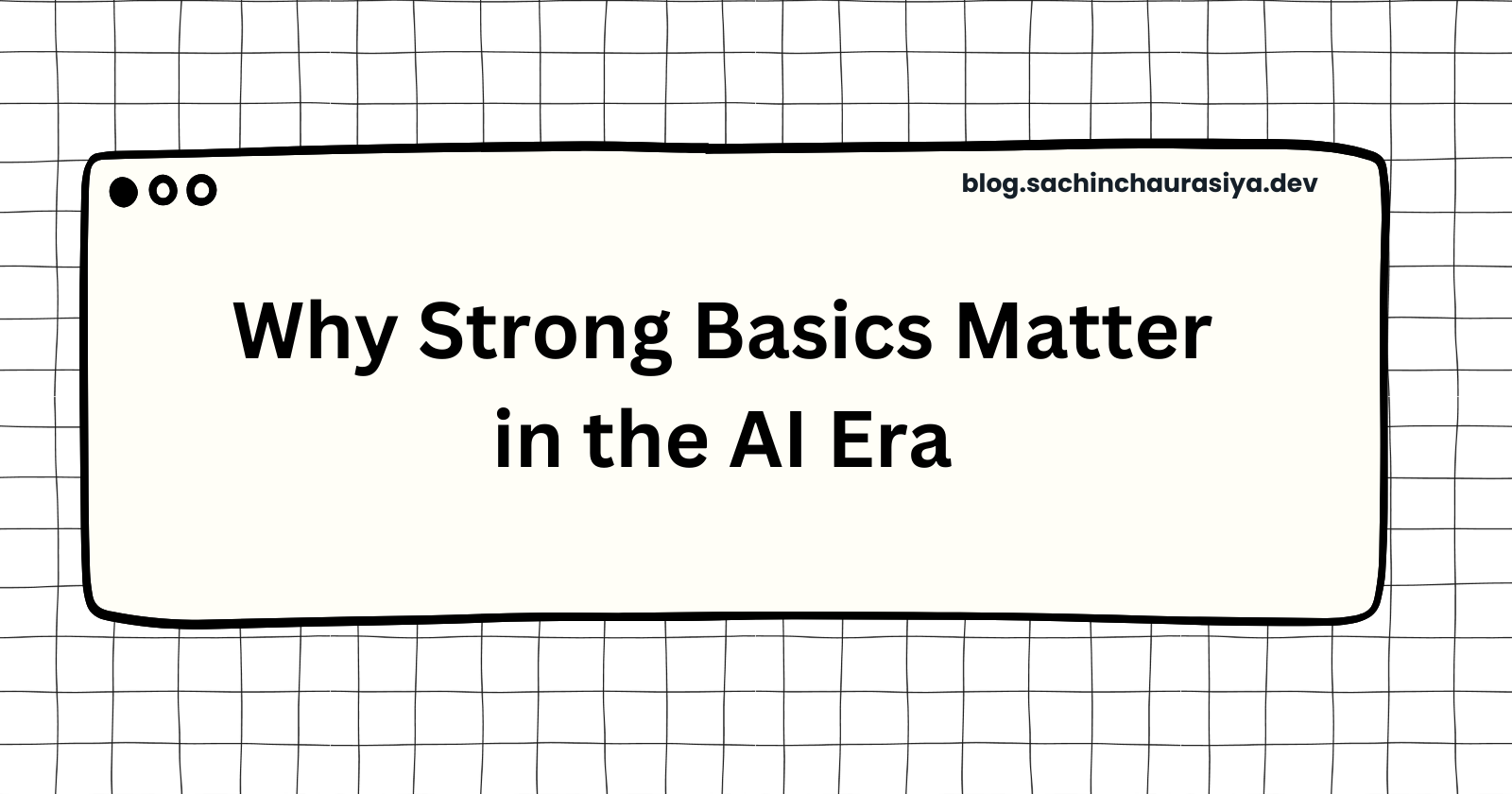Why Strong Basics Matter in the AI Era
 Sachin Chaurasiya
Sachin Chaurasiya
AI tools have changed how we build software. They can write code, fix bugs, and even help understand large codebases. But as AI gets better, one thing remains true: the better the input, the better the output.
To give AI the right instructions, you need to know what you want, why you want it, and how it will impact your work. That's why having strong basics in coding and problem-solving is more important than ever.
How AI is Changing Software Development
AI has changed how developers work in several ways:
Writing Code
AI tools can write functions, classes, or components based on descriptions. They understand context and can match your coding style.
Understanding Code
AI can analyze large codebases, explain unfamiliar code, and find patterns across different parts of your project.
Finding and Fixing Problems
These tools can spot bugs, suggest fixes, and find performance issues that humans might miss.
Automating Repetitive Tasks
Tasks like creating standard code, transforming data, and making tests can be automated with AI, letting developers focus on more important work.
Helping with Documentation
AI can create, summarize, and update documentation to keep information current.
These features boost productivity, but they depend on your ability to guide the AI effectively. Unclear instructions lead to poor solutions, which is why knowing the basics is so important.
Why The Basics Matter More Now
Good In = Good Out
AI works like this: what you tell it decides what you get back. Clear instructions get good answers. You need:
Basic Skills: Know how coding works so you can ask for what you need
Planning Skills: Understand how parts fit together to guide AI
Problem-Solving: Break big problems into small pieces AI can handle
Know What You Want First
Before asking AI for help, you must know:
What's the real problem? What can't be changed?
Why this way? What other ways could work?
Will it stay good? Is it fast? Easy to fix? Can it grow?
Without these answers, you might get something that works but causes problems later.
Check AI's Answers
Never just trust what AI gives you. Good basics help you:
Find mistakes in AI's code
See security problems AI missed
Make sure the code follows good practices
Check that it actually fixes your problem
Stop Rewording Your Questions
Many people get stuck asking AI the same thing different ways. Strong basics help by:
Letting you ask clearly the first time
Helping you understand what AI says back
Showing how to make real improvements
How to Use AI Better
Think Before You Ask
Start with your own brain:
Know your problem before asking AI
Think of some answers yourself first
Pick parts where AI can help the most
Gather facts that AI needs to understand
Always Double-Check
Never just use what AI gives you:
Try weird cases that might break it
Make sure it's fast, not just working
Look for safety problems AI missed
Keep it simple so others can read it
Get Better Each Time
When AI gives bad answers:
Ask why it didn't work
Learn more about your problem
Add helpful facts in your next try
Break big questions into smaller ones
Conclusion
AI is a great tool, but it can't replace knowledge and experience. To get the most out of it, focus on learning the basics, thinking critically, and improving your problem-solving skills. With strong fundamentals, AI can help you work faster and smarter.
Subscribe to my newsletter
Read articles from Sachin Chaurasiya directly inside your inbox. Subscribe to the newsletter, and don't miss out.
Written by

Sachin Chaurasiya
Sachin Chaurasiya
Hi there 👋, I’m Sachin Chaurasiya, a software engineer with over 4 years of experience in building scalable, performant, and user-centric products. I enjoy solving challenging problems and creating products that make a difference for users. Collaboration is a big part of my work. I’ve worked closely with designers, backend engineers, and other teams to deliver solutions that are efficient and easy to use. I also enjoy mentoring and guiding other engineers to help them grow in their careers. I believe in taking ownership of my work and always strive to go the extra mile to ensure high-quality results. Beyond work, I love sharing knowledge through writing technical blogs and contributing to open-source projects, and I am currently contributing to OpenMetadata and ReactPlay. If you’re looking for someone who’s passionate about building impactful products and working as part of a team, let’s connect and create something amazing together. You can reach me at sachinchaurasiya.dev@gmail.com.